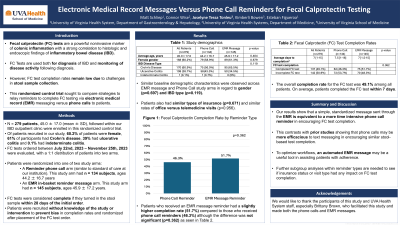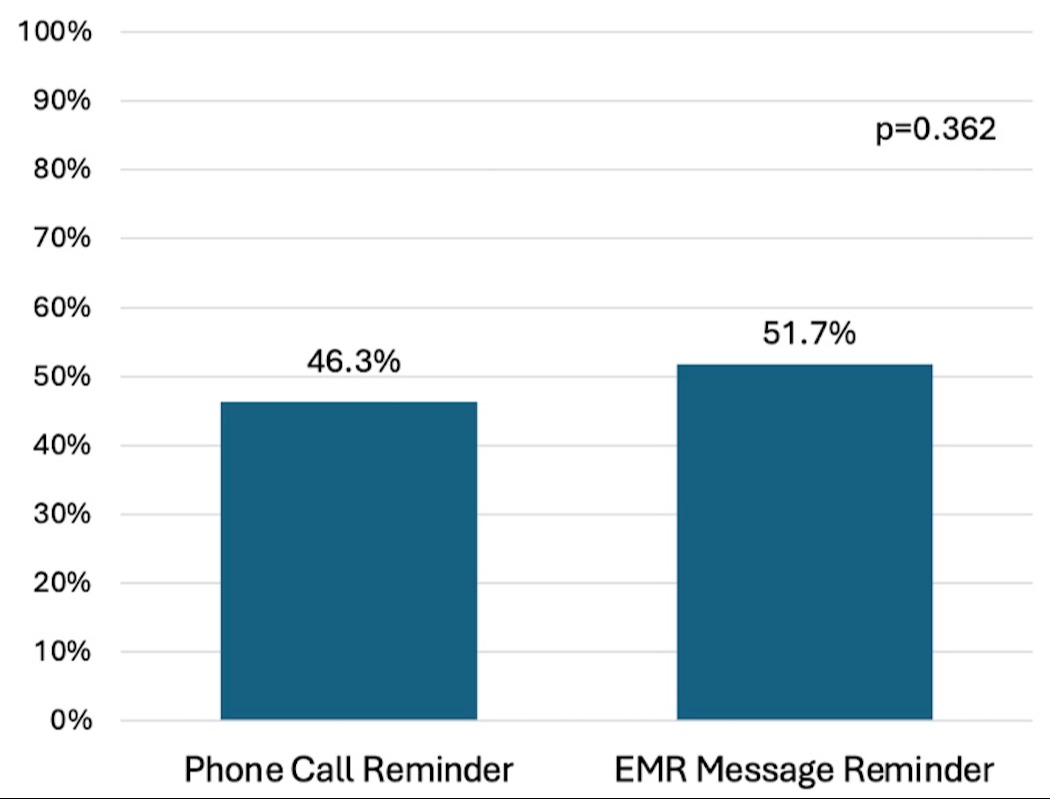Sunday Poster Session
Category: Practice Management
P1504 - A Head-to-Head Randomized Controlled Trial of Electronic Medical Record Text Messages vs Phone Call Reminders for Fecal Calprotectin Testing
Sunday, October 27, 2024
3:30 PM - 7:00 PM ET
Location: Exhibit Hall E

Has Audio

Joselyne Tessa Tonleu, BA
University of Virginia School of Medicine
Charlottesville, VA
Presenting Author(s)
Award: ACG Outstanding Research Award in the Practice Management Category (Trainee)
Award: Presidential Poster Award
Matthew Schliep, MD1, David Connor. Wise, MD1, Joselyne Tessa Tonleu, BA2, Kimberli Bowen, BS2, Esteban Figueroa, MD3
1University of Virginia Medical Center, Charlottesville, VA; 2University of Virginia School of Medicine, Charlottesville, VA; 3UVA Health, Charlottesville, VA
Introduction: Fecal calprotectin (FC) tests are a useful noninvasive marker of colonic inflammation in inflammatory bowel disease (IBD). It is used clinically both in diagnosis of IBD flares and monitoring disease activity. However, test completion rates remain low due to challenges in stool sample collection. We designed a simple randomized trial comparing strategies to relay reminders to complete FC testing via electronic medical record (EMR) messaging versus phone calls.
Methods: We conducted a randomized, controlled trial in our IBD specialty clinic with outpatient FC tests ordered between July 22nd, 2023 to November 25th, 2023 with a 1:1 distribution of patients into 2 arms. We compared a reminder phone call (standard of care at our institution) versus an EMR reminder message from the patient care coordinator within 2 weeks of the FC test order date. Patients were recruited without knowledge of the study to prevent bias in completion rates. FC tests were considered complete if they turned in the stool sample within 28 days of the initial order.
Results: Overall, 279 patients were enrolled with a FC ordered during the study period (Table 1). 60.2% of patients were female and 60.9% of patients had Crohn’s disease. The phone call versus EMR message groups were similar in baseline characteristics such as gender (p=0.697) and IBD type (p=0.119). They also had similar types of insurance (p=0.671) and similar rates of office versus telemedicine visits (p=0.956). The overall completion rate for the FC test was 49.1% among all patients. On average, patients completed the FC test within 7 days. Patients who received an EMR message reminder had a slightly higher completion rate (51.7%) compared to those who received phone call reminders (46.3%) although the difference was not significant (p=0.362) as seen in Figure 1.
Discussion: Our results show that a simple, standardized message sent through the EMR yielded equivalent FC completion rates compared to a more time intensive phone call reminder in patients with IBD. This contrasts with prior studies showing that phone calls may be more efficacious to text messaging in encouraging similar stool-based test completion. To optimize workflows, an automated EMR message may be a useful tool in assisting patients with adherence. Further subgroup analyses within reminder types are needed to see if age, insurance status, or visit type had any impact on FC test completion, which may identify groups that would be better served with a phone call reminder.

Note: The table for this abstract can be viewed in the ePoster Gallery section of the ACG 2024 ePoster Site or in The American Journal of Gastroenterology's abstract supplement issue, both of which will be available starting October 27, 2024.
Disclosures:
Matthew Schliep, MD1, David Connor. Wise, MD1, Joselyne Tessa Tonleu, BA2, Kimberli Bowen, BS2, Esteban Figueroa, MD3. P1504 - A Head-to-Head Randomized Controlled Trial of Electronic Medical Record Text Messages vs Phone Call Reminders for Fecal Calprotectin Testing, ACG 2024 Annual Scientific Meeting Abstracts. Philadelphia, PA: American College of Gastroenterology.
Award: Presidential Poster Award
Matthew Schliep, MD1, David Connor. Wise, MD1, Joselyne Tessa Tonleu, BA2, Kimberli Bowen, BS2, Esteban Figueroa, MD3
1University of Virginia Medical Center, Charlottesville, VA; 2University of Virginia School of Medicine, Charlottesville, VA; 3UVA Health, Charlottesville, VA
Introduction: Fecal calprotectin (FC) tests are a useful noninvasive marker of colonic inflammation in inflammatory bowel disease (IBD). It is used clinically both in diagnosis of IBD flares and monitoring disease activity. However, test completion rates remain low due to challenges in stool sample collection. We designed a simple randomized trial comparing strategies to relay reminders to complete FC testing via electronic medical record (EMR) messaging versus phone calls.
Methods: We conducted a randomized, controlled trial in our IBD specialty clinic with outpatient FC tests ordered between July 22nd, 2023 to November 25th, 2023 with a 1:1 distribution of patients into 2 arms. We compared a reminder phone call (standard of care at our institution) versus an EMR reminder message from the patient care coordinator within 2 weeks of the FC test order date. Patients were recruited without knowledge of the study to prevent bias in completion rates. FC tests were considered complete if they turned in the stool sample within 28 days of the initial order.
Results: Overall, 279 patients were enrolled with a FC ordered during the study period (Table 1). 60.2% of patients were female and 60.9% of patients had Crohn’s disease. The phone call versus EMR message groups were similar in baseline characteristics such as gender (p=0.697) and IBD type (p=0.119). They also had similar types of insurance (p=0.671) and similar rates of office versus telemedicine visits (p=0.956). The overall completion rate for the FC test was 49.1% among all patients. On average, patients completed the FC test within 7 days. Patients who received an EMR message reminder had a slightly higher completion rate (51.7%) compared to those who received phone call reminders (46.3%) although the difference was not significant (p=0.362) as seen in Figure 1.
Discussion: Our results show that a simple, standardized message sent through the EMR yielded equivalent FC completion rates compared to a more time intensive phone call reminder in patients with IBD. This contrasts with prior studies showing that phone calls may be more efficacious to text messaging in encouraging similar stool-based test completion. To optimize workflows, an automated EMR message may be a useful tool in assisting patients with adherence. Further subgroup analyses within reminder types are needed to see if age, insurance status, or visit type had any impact on FC test completion, which may identify groups that would be better served with a phone call reminder.

Figure: Figure 1: Fecal Calprotectin Completion Rate by Reminder Type
Note: The table for this abstract can be viewed in the ePoster Gallery section of the ACG 2024 ePoster Site or in The American Journal of Gastroenterology's abstract supplement issue, both of which will be available starting October 27, 2024.
Disclosures:
Matthew Schliep indicated no relevant financial relationships.
David Wise indicated no relevant financial relationships.
Joselyne Tessa Tonleu indicated no relevant financial relationships.
Kimberli Bowen indicated no relevant financial relationships.
Esteban Figueroa: Abbvie – Speakers Bureau.
Matthew Schliep, MD1, David Connor. Wise, MD1, Joselyne Tessa Tonleu, BA2, Kimberli Bowen, BS2, Esteban Figueroa, MD3. P1504 - A Head-to-Head Randomized Controlled Trial of Electronic Medical Record Text Messages vs Phone Call Reminders for Fecal Calprotectin Testing, ACG 2024 Annual Scientific Meeting Abstracts. Philadelphia, PA: American College of Gastroenterology.

